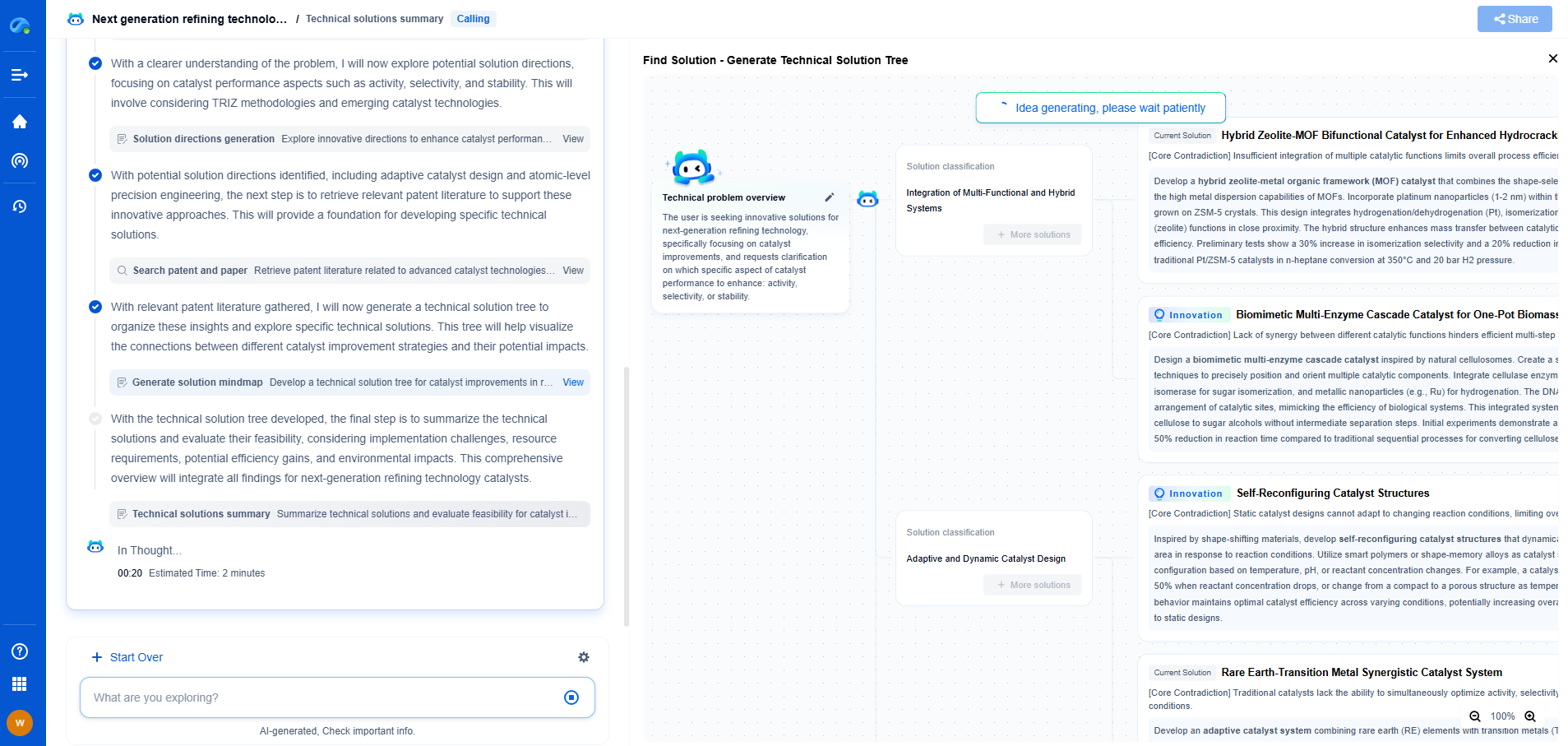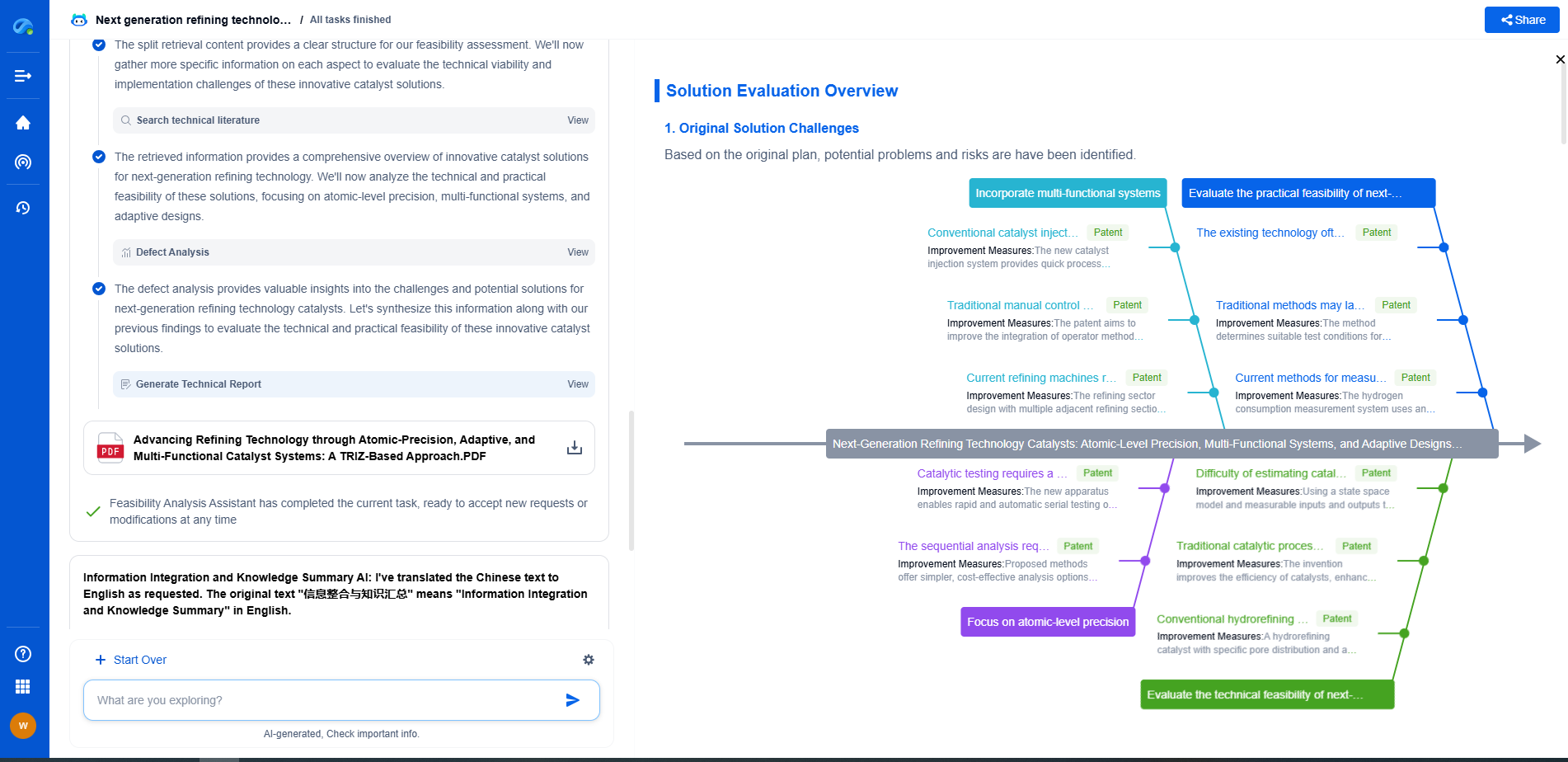Space Station Water Recycling: Forward Osmosis for Zero-Gravity Filtration
JUL 25, 2025 |
The Challenges of Water Recycling in Space
Recycling water in space is not a straightforward task. The unique environment of zero gravity presents distinct challenges that are not encountered on Earth. Water does not behave the same way without gravity; it can form globules or adhere to surfaces unpredictably. This necessitates the development of systems that can effectively manage and recycle fluids in a microgravity environment.
The ISS currently uses a combination of technologies to reclaim water from various sources, including urine, sweat, and exhaled breath. However, these systems require high energy consumption and regular maintenance, which are less than ideal for long-duration missions. As we aim to venture further into space, developing more efficient, low-energy systems becomes critical.
Understanding Forward Osmosis
Forward osmosis is a natural and energy-efficient process that uses a semi-permeable membrane to separate water from contaminants. Unlike reverse osmosis, which requires external pressure to move water through the membrane, forward osmosis relies on a natural concentration gradient. The process draws water from a low-concentration solution (feed solution) into a high-concentration solution (draw solution), leaving contaminants behind.
This method is particularly appealing for space missions due to its low energy requirements and the potential to create compact, easily deployable systems. Additionally, forward osmosis is less prone to fouling, a common problem in traditional filtration systems, which can hinder performance and require frequent cleaning.
Advantages of Forward Osmosis in Space
The adoption of forward osmosis for water recycling in space offers several advantages:
1. **Energy Efficiency**: Forward osmosis requires less energy compared to other filtration methods. In space, where energy is a limited resource, this is a significant benefit.
2. **Simplicity and Reliability**: The system's simplicity reduces the likelihood of mechanical failures, which are challenging to address in space. This reliability is crucial for long-term missions.
3. **Scalability and Portability**: Forward osmosis systems can be designed to be compact and lightweight, making them ideal for the constrained environments of space habitats.
4. **Versatility**: The technology is adaptable to various sources of wastewater, ensuring that nearly all water on board can be reclaimed and reused.
Applications and Future Prospects
The successful implementation of forward osmosis aboard the ISS could pave the way for its use in future missions to the Moon, Mars, and beyond. The technology aligns well with the goals of sustainability and self-sufficiency that are essential for long-duration exploration missions.
Moreover, the advancements made in developing forward osmosis systems for space have significant implications for Earth. Water scarcity is a growing concern globally, and the innovations driven by space exploration can contribute to more sustainable water management practices on our planet. By refining forward osmosis technology, we can improve water treatment processes in areas with limited resources, offering a dual benefit of supporting both space exploration and terrestrial needs.
Challenges and Considerations
Despite its advantages, forward osmosis technology is not without challenges. One of the primary concerns is the development of suitable draw solutions that can be easily regenerated and reused without leaving harmful residues. Researchers are actively working on this, alongside efforts to optimize membrane performance and lifespan.
Additionally, integrating forward osmosis with existing water recovery systems on the ISS poses logistical and technical challenges. The technology must be thoroughly tested and validated to ensure it meets the rigorous demands of space missions.
Conclusion
Forward osmosis stands as a beacon of innovation in the quest for efficient water recycling in space. Its potential to transform how we manage water resources both in orbit and on Earth is immense. As we continue to explore the cosmos, the need for sustainable life support systems will only grow, and forward osmosis could be at the forefront of this endeavor. By harnessing this technology, we not only take a step closer to self-sufficient space travel but also contribute to solving some of the most pressing water challenges on Earth.
From next-generation membrane materials to high-efficiency separation processes for pharmaceuticals, water treatment, food processing, or energy systems, the filtration & separation industry is rapidly evolving with a surge in material innovation, microstructure design, and process optimization.
Patsnap Eureka, our intelligent AI assistant built for R&D professionals in high-tech sectors, empowers you with real-time expert-level analysis, technology roadmap exploration, and strategic mapping of core patents—all within a seamless, user-friendly interface.
Whether you're designing the next high-throughput filter, optimizing nanostructured surfaces, or exploring new separation media for emerging industries—Patsnap Eureka gives you AI-driven insights in seconds, helping you move from ideation to innovation with confidence.
🚀 Start your free trial today and experience how Eureka transforms filtration innovation—from reactive to predictive.
- R&D
- Intellectual Property
- Life Sciences
- Materials
- Tech Scout
- Unparalleled Data Quality
- Higher Quality Content
- 60% Fewer Hallucinations
Browse by: Latest US Patents, China's latest patents, Technical Efficacy Thesaurus, Application Domain, Technology Topic, Popular Technical Reports.
© 2025 PatSnap. All rights reserved.Legal|Privacy policy|Modern Slavery Act Transparency Statement|Sitemap|About US| Contact US: help@patsnap.com

